#there are COUNTLESS examples of this - which i will give the highlights of when i actually DO make the post
Explore tagged Tumblr posts
Text
i can’t remember if i ever actually made the Ravenous Ghost Bell analysis post, but i wish i had time to make it because i feel like it would be received well in this moment…
#i mean… tldr: ghosts are real in Ravenous#mostly in the heads of the people who ate them#both to harass them in nightmares but also to influence their physical actions#(usually as an echo of something they themselves did in life)#there are COUNTLESS examples of this - which i will give the highlights of when i actually DO make the post#but there’s specifically a moment in the final Boyd-Ives showdown where a bell is rung#and we don’t see who rang it but it causes Boyd to focus and draws him to the barn where he sees the bear trap and is Inspired#and we can presume that the bear trap was Reich’s idea (based on that deleted bear trap shooting scene that i made the gifset of)#but then WHO rang the bell??#obviously it is implied to (and must have been) Ives#but why did he do it?#to get Boyd’s attention - naturally… sounds like him#he knows that time is ticking… wants to lure Boyd to his trap#BUT the thing is that Ives ate Reich too#and i feel like (being a long-time cannibal with no moral compass) he is probably Less influenced by the people he eats than Boyd is#but i also like to think that - in that moment - Reich subconsciously influenced him to do it#because - notably - Reich was the one who rung that bell the last time he left Fort Spencer - he’s the only character we see so it#so like. tldr again: ghosts are Real in Ravenous and Reich’s ghost rung the bell in that scene#to help Boyd focus and lead him to the solution that would give him the upper hand in the conflict to defeat Ives#and someday i will write ALL of that up properly - but it’s just SO good and i love to talk about it#so here i am#ghostposting the night away…#not tagging this because i want the REAL analysis to get notes whenever i post that#but feel FREE to chat with me about this if you see it!#i love Ravenous and i miss talking about it#i have SO much to say lol
10 notes
·
View notes
Text
Revival Mulder Was Diagnosed with the Wrong Depression

In My Struggle I, Sveta reveals Scully diagnosed Mulder with "endogneous depression", which is a type of major depressive disorder (MDD, also known as clinical depression.) However, the clues provided in canon don't quite add up.
According to healthline: "Endogenous depression occurs without the presence of stress or trauma. In other words, it has no apparent outside cause. Instead, it may be primarily caused by genetic and biological factors. This is why endogenous depression might also be referred to as “biologically based” depression." And verywellmind explains: "People with endogenous depression often feel that their symptoms occur “for no reason”—at least in the sense that there is no apparent external cause.... For example, a person with a family history of mental illness may be more likely to develop depression."
From the get-go, those descriptions don't fit Mulder; but they make less sense when compared to exogenous depression.
Again, according to healthline: "Exogenous depression happens after a stressful or traumatic event takes place. This type of depression is more commonly called “reactive” depression." And verywellmind further clarifies: "Exogenous (or reactive) depression is triggered by an outside stressor such as the loss of a loved one, getting divorced, or losing your job. People who experience or witness a traumatic event may develop depression as a direct result of that exposure."
(Although current thought lumps both "types" of depression together by their similarities rather than their differences, the show went out of its way to highlight which depression it picked. It chose... poorly.)
The cherry on top? Scully didn't have the expertise to diagnose her partner with endogenous depression, regardless. healthline: "To be diagnosed with MDD, you must meet certain criteria listed in the Diagnostic and Statistical Manual of Mental Disorders (DSM). This manual is often used by mental health professionals to diagnose mental health conditions." And verywellmind: "Your primary care doctor may evaluate you for depression in the office, but they might also want you to see someone who specializes in diagnosing and treating mental illness, such as a psychiatrist." (Even though Scully also "diagnosed" a side character's mental state in Founder's Mutation, the fact that she was unqualified to do so in either circumstance remains.)
Lastly, verywellmind gives us a clinching little tidbit: "Another difference is that people with exogenous depression don't always have the physical symptoms of depression, like having trouble sleeping or change in appetite, which is common in other forms of the condition." (Which would fit Mulder's seeming "normality" during the early Revival episodes. Mulder already had odd habits to begin with, anyway-- it would be easy to tuck away his symptoms from casual observers.)
So, we're told that Fox Mulder-- a man who only canonically displayed depressive symptoms after a traumatic event; and who had, apparently, no recollection whatsoever of a predisposition towards depression before Samantha's abduction-- collapsed inwardly due to... biological or genetic factors? Rather than collapsing because of, I don't know, the countless losses and failures he suffered through the years (which would be in-line with his pre-established trauma response?)
Sigh.
Thanks for reading~
Enjoy!
#txf#xf meta#Revival#endogenous depression#depression#thoughts#mine#siiiiiiiiigh#he's not consistently written as depressed either#but that's another discussion for another day#My Struggle I
51 notes
·
View notes
Note
Curious if you'd say you've ever seen a superhero work that genuinely deserved the alt-history genre classifier, and otherwise at what point its even possible to use it vs going 'this has decades of in-universe history but doesn't deserve to be called alt-history for [REASONS]'
Only one I can think of off-hand that has enough granulated timeline-development would be Wild Cards, but curious if you think others qualify and/or if you think WC doesn't qualify
I can't really comment on Wild Cards extensively (haven't read that much of it) but I can comment on a few other works. To briefly be the guy who talks about the same three works all the time:
Watchmen I think totally qualifies- Nixon is on his fifth term, electric cars are ubiquitous due to Dr. Manhattan's ability to synthesize lithium, Vietnam is the 51st state, the zeitgeist is consumed by pirate comics, and everyone in New York got murdered by a giant fake squid. And superheroes are real.
Unfortunately I also have to note that The Boys flirted with this; among other things, superheroic "intervention" resulted in the Brooklyn Bridge getting destroyed during 9/11, Prescott Bush and some of the other Business plot guys got wiped out during an attempted superheroic field test in World War 2, The War on Terror is being fought primarily in Pakistan, and Dakota Bob is president because George Bush Jr. killed himself playing with a chainsaw. The fact that none of this really pans out into a tangibly different society is deliberate, as part of the comic's drumbeat that superheroes, while roundly bad, also fundamentally don't matter, and are at best able to make things bad in different ways without really changing the shape of the structures that produced them.
Worm is in kind of a weird spot here- it objectively is an alternate history, countless things are different, whole nations are gone, we see a lot of alterations to the culture- but it gives limited airtime to a lot of the specifics of how things got to where they are, beyond the broad clusterfuck generated by the parahumans. To some extent, the fact that the world is radically different is downplayed until the back half because society at the start of the story is Stepford-smiling through an immanent apocalypse- and, you know, the immanent apocalypse is ultimately kind of the relevant difference from our world. But on the whole, I doubt there's a really tight worldbuilding document documenting all the ripple effects on the dramatis personae of history. The story's pretty vague about, for example, what the American presidential lineup has been since Reagan, what electoral politics look like in a world of Capes. It's vague about basically everything else in that nitty-gritty, concrete-details vein.
I do think that all of these, Worm in particular, highlight a major issue you're gonna run into when trying to do alternate universe stuff with capes, and it's that, first of all, doing really robust, thoughtful and fleshed-out alternate history is already really fucking hard, requiring a strong command of the history and culture of maybe up to the entire world, depending on the scope of your project- and superhero stuff already suffers from really strong American provincialism, so the depictions can get stupid fast if you aren't careful. Then on top of that the nature of the cape genre is that you're going to be following a pretty pared-down central cast; authorial and audience bandwidth will be tied up with what's going on with these specific guys over the course of their story, which can get in the way of a birds-eye view of their world, unless you're specifically structuring the story in a way to dodge that issue (which, you know, I get the impression Wild Cards did.)
I also think a commonality in the above works is that a lot of the alt-history changes are instrumental, included not as the result of the author trying to hyper specifically model falling dominoes from a specific point of change, but because they help the work to make its point. I doubt Alan Moore has a one-hundred-page forum thread detailing the fallout of America winning the Vietnam War, but such a thing would be beside the point- which is that God being an American Agent would fuck shit up geopolitically, regardless of the specifics. I mean a lot of this is vibes-based already, right? In objective terms the MCU has been an alternate history for years, but it doesn't claim that label, doesn't market itself as such, so it isn't. I think it comes down to whether you decide to wear that outfit on the runway, and how well it hangs on you once you've opened yourself to judgement on those grounds.
#thoughts#meta#anyway if a World War Z style mockumentary about the superhuman age doesn't exist I'm gonna have to write it#ask#asks#worm#watchmen#parahumans#the boys#effortpost
54 notes
·
View notes
Text
How to use time efficiently with many interests and work commitments.
⋅•⋅⊰⋅⋅•⋅∙∘☽༓☾∘∙•⋅⋅⋅•⋅⋅⊰⋅•⋅⋅•⋅∘☽༓☾∘∙•⋅⋅⊰⋅•
Being productive, making the most of the 24 hours of our day and getting a high ROI back is your goal, but your daily schedule and the endless appointments that you have make you too tired to get work done, let you feel like you have no free time, no time to even study, and you have to spend countless all nighters to get your work done questioning yourself why you chose so many activities/ extracurricular's etc. in the first place and all the free time you have your essentially doomscrolying it away making you more unmotivated.
This is a guide on how you can use your time efficiently and get a huge ROI back without feeling exhausted/tired and finding enough time to study thoroughly, getting your work done without loosing your passion for other things and doing your hobbies.
So the first thing you have to do is to go to a regular week and observe when you have free time, when you are binge-watching shows, doomscroll or when you are so unmotivated that you don't want to do your work, study, do your homework etc. and also what tasks do you have when you go to work/school when you come back, clubs meetings etc. So everything you do regularly in the week
Lastly in this week you have to identify a Prime time where you are the most productive so you can plan your tasks around it.
A list can look like this:
Observation
Monday: Going home from work/school at 16:30 - one hour free time - until I have to go to extracurriculars/ course etc.
Tuesday
Wednesday
….
Prime time: Weekdays 10-12pm Weekend 9-12am
₊˚ ‿︵‿︵‿︵୨୧ · · ♡ · · ୨୧‿︵‿︵‿︵ ˚₊˚ ‿︵‿︵‿︵୨୧ · · ♡ · · ୨୧ ₊˚
So, after you got the times where you are doing nothing/ wasting your time you have to start listing all the tasks and events you have, then categorize them based on importance and urgency.
For this you can use the Eisenhower-matrix
where you organize your work and projects into four categories: Important and Urgent, Important but Not Urgent, Urgent but Not Important, Not Urgent and Not Important.
The Eisenhower matrix, also known as the Urgent-Important matrix, is a time management strategy that helps you prioritize tasks based on urgency and importance.
The matrix has 4 quadrants or sections:
Important and Urgent: These tasks need immediate attention.
Important but not urgent: These are high priority items.
Urgent but not important: These are things that are time-sensitive but can often be delegated.
Not urgent and not important: These are activities that can either be delayed or removed from the list entirely.
example:
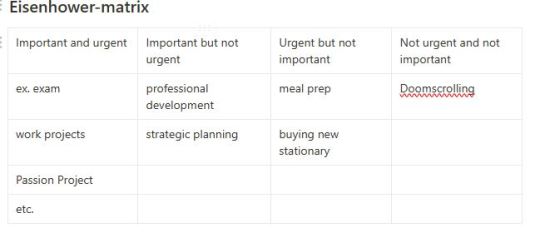
Planning your week in a strategic way
First you should Collect your observations in a 24 hours weekly planner like this and highlight the free time zones you have and also plan your regular sleeping time mine is from 10 to 5:30 am
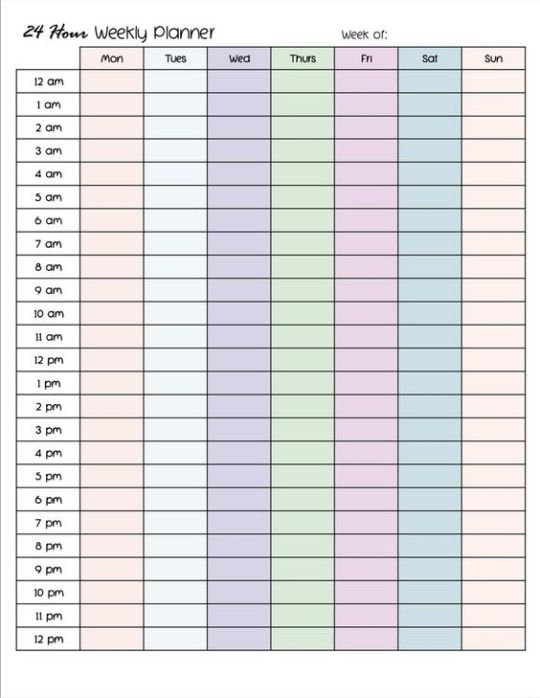
How to fill the free-spots:
Start by allocating time for high-priority tasks, then move on to lower priority ones, and finally use remaining time for recreation.
Place the high priority task in the (near the) prime time
If there are regular recurring tasks like homework hobbies etc. you should put it in a designated time slot
Try to avoid overworking yourself and prioritize your mental health.
Remember to take breaks in between tasks and give yourself a reward after completing something difficult or time consuming.
It's basically time blocking which is a method where you divide and schedule your day into focused intervals with no distractions
How to do the most in the weekend
After such a full week doing all your tasks you're obviously going to be tired and unmotivated to do anything. But the workload isn't going to get smaller but bigger in the next week, so you have to at least get something done. But do not force yourself to be 100% productive in the weekend because we all need some rest and constantly overworking yourself is unhealthy and also doesn't give you a good ROI in the long run.
Here are some methods that I've tried categorized in three levels: high; medium and low level depending on the mood you're in.
High level methods
The first method I suggest you to do is a method that is called Batch Tasking by Grouping
With this technique, you group similar tasks together and complete them in batches.
For example, you can have a morning batch of 'work-related tasks', an afternoon batch of 'personal tasks', and an evening batch of 'leisure tasks'.
This method can be useful for individuals who are motivated by completing multiple similar tasks at the same time, and it helps to avoid task switching and maintain a clear sense of purpose in your workflow.
The second method is the the "Marathon Mindset" technique
It's a method where you set a specific amount of time, say 3-4 hours, to focus intensely on completing your tasks. During this time, you can take short breaks (around 10 minutes) to prevent burnout, but the focus is on maintaining a steady work rate for the entire duration.
This technique can help you complete difficult tasks, and it's excellent for individuals who get into a 'flow' state when working on a project.
Medium level methods:
time boxing
This involves setting a timer for a specific amount of work, and once the timer goes off, you move onto the next task, no matter how much work was done. This helps create a sense of urgency and focus.
Time Boxing and Activity Swapping technique
Here, you set a short amount of time, say 15 minutes, for each task you want to complete. Once the timer goes off, you take a 5 minute break before moving onto the next activity.
But here's where it gets different: Each time you finish a task, you swap to a completely different activity than the last one. For example, after writing an email, you could do some calisthenics, then after that some cleaning, and so on.
This technique is great for individuals who struggle with task boredom
Low level methods
Focus on your "1 Thing"
it means working on the most important task each day, the "one thing" that'll move you closer to your goals. Once you've completed that 'One Thing' you can move onto the next.
This technique will help you to avoid multitasking and stay motivated, focusing your energies on completing the most crucial tasks first
Focus Sprint and Rest
Here, you work in intense 15-minute sprints, followed by a short 5 minute break. You repeat the routine 2-4 times before taking a longer break of around 15-30 minutes.
You can alternate between tasks or stay focused on one, depending on your preferences. This method is great for individuals who prefer shorter bursts of intense work, with short but regular breaks for a quick boost in energy.
Priority Power Hour
Using this technique, you dedicate a specific time of day, say 1 hour, to working on your most important and difficult tasks. Optimally this should be your power hour During this power hour, you commit to nothing else except completing these high-priority tasks.
The rest of your day can be spent doing less important tasks or working on other passions. The key benefit of this technique is that it allows you to stay focused and productive during your most efficient times of the day, while avoiding burnout.
Some last general tips
First, you should set achievable goals. This means breaking big tasks into small ones. This is very helpful if you have a big project that you have to do because the task load doesn't overwhelm you as much when you break aspects e.g. research as doing the whole project in a couple days and being very stressed.
Then you should limit distractions like your mobile etc. I would pack those things to another room so that they are not in front of your eye which makes you less likely to use them and get distracted. Also you should try to minimize multitasking because it diverts your attention on too many tasks and topics which makes your work imprecise and actually costs more time because you have to get into the thought process of topic 1 again.
Start with the end in mind. Define what you want to achieve during your sessions. Having clear goals helps you stay focused.
It's also important to schedule short breaks in the work session especially if you have many things to do to prevent burnout.
You should also have a monthly overview of important tasks separatly in a calendar
Regularly review your time management strategies and adjust them as needed. What's working? What needs improvement?
Lastly you should give yourself some rewards if you completed a difficult and important task to make you more motivate for more tasks
#wonyoungism#girlblogging#pink academia#becoming her#becoming that girl#girl blogger#pink pilates princess#productivity#time management#studyblr#productivitytips#productivityboost#productivity challenge#timemanagement#advice#that girl#dream girl essence#notion#time management strategies#dream girl#How to be NOT STRESSED out if you have a full plan#studyspo#literally me𓈒ㅤׂㅤ𐙚 ࣪ ⭒#Let's get productive Y'all#it girl energy#academic weapon#academic barbie#self improvement#self development#management
33 notes
·
View notes
Text
of our own making
(an X-Files fanfic)
Chapter 16/34 - mailbox
[Read on AO3]
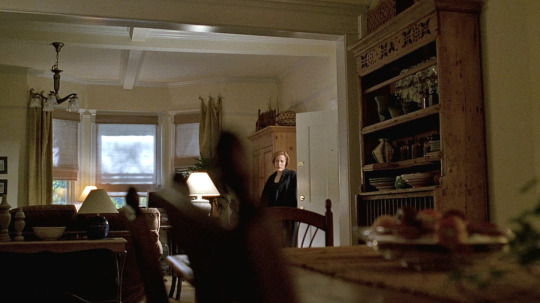
Once, when Dana was twelve and already filled with the ferocious independence of a teenager, she tried out for the school play and was cast as the lead role. This, of course, she told absolutely no one.
She was lucky neither of her brothers was at the same school at the time, or her secret wouldn’t have lasted a day. Instead, she claimed to have joined an after-school study group, and simply told her mother to pick her up an hour later, please and thank you.
This went on for about a week, until one night after she’d gone to bed, Maggie went into her room to check on her. Her strong-willed youngest daughter had fallen asleep on top of the open script book, halfway through meticulously highlighting her lines on the page.
The jig was up.
Maggie debated the merits of waking her and dragging the truth out into the open. ‘There’s nothing to be embarrassed about,’ she might say. ‘Why didn’t you tell me?’
But then, Dana could never be forced to do something when she wasn’t good and ready to do it. Maggie knew her daughter well enough to know that.
In the end, she left the bedside lamp on, left her daughter untucked on her bed, because even the slightest thing out of place would tip her off—maybe even force a confession out of her. Maggie didn’t want that.
Dana would tell her someday. When she was ready. Until then, she’d continue on as if she were none the wiser, supporting her in whatever way she could from a distance.
She finally came clean the morning of the big play, which was admittedly later than Maggie had expected. Looking back, though, perhaps she should have known. Dana was always a stubborn one.
“Mom? You know how I said I joined that study group?”
Maggie had acted surprised, but made sure to show her enthusiasm. She had shown up to the play with a bouquet of flowers to give her afterward, hugging and kissing her with all the sincerity and pride a mother ought to have.
Dana had performed brilliantly, and although she decided that acting wasn’t for her, she had at least tried something new. That was a lesson Maggie had always tried to impart on all her children, but it was Dana that seemed to take it to heart, sometimes to the frustration of her parents.
Strong-willed and independent, that was their Dana. She’d face the unknown, even if it scared her. Only, she’d do it by herself without ever asking for help. That was her way.
Later—years later—she told Maggie that the reason she hadn’t told the truth from the beginning was that she was afraid she wouldn’t be any good, or that people would make fun of her. There’s an inherent insecurity that comes with trying something for the first time, and Dana dealt with that by hiding herself away until she was absolutely certain she could do it. The play was just one example. There were countless others throughout her childhood that she could point to. Even her move from medicine to the FBI was marked by the same pattern.
And now, staring at the mailbox in the lobby of Dana’s apartment building, Maggie gets the distinct impression that she’s in another such situation right now.
She sighs.
‘Dana Scully,’ the mailbox reads. With Fox Mulder’s name tacked on at the bottom.
She’d tried calling first. Really, she had. After the last time, she truly didn’t want to drop by unannounced. But no one had answered, and all she wanted was to bring by an early birthday present before heading out to San Diego for the next month, so here she was.
She’ll have to just mail it. Just like she’d let the highlighter marker dry out, left without a cap on all night long when Dana was twelve, now she would leave her daughter to her secrets, having the faith that she would entrust her with them when the time was right.
There are a number of reasons Fox Mulder could be living at her daughter’s apartment.
Selfishly, Maggie hopes and hopes it’s for the reason she’s always thought it could be, if only her daughter and that partner of hers would finally open their eyes.
-.-.-
“Hi sweetheart. I thought I might stop by, if this afternoon is alright with you. I have your birthday present. I’m leaving to visit Bill and Tara tomorrow, you know, so I just want to make sure you get it. Call me back when you get a chance. Love you!”
The answering machine beeps, and Mulder looks up from his place on the couch to see Scully looking ghostly pale.
“That was from this morning,” she says, worrying her lip between her teeth as she glances out the window at the darkened street outside. “I don’t know why she didn’t call my cell. I hope she didn’t stop by.”
Mulder wonders, sometimes, if this secret keeping thing is worth the anxiety Scully suffers over it. In his opinion, definitely not, but it’s not his decision to make.
“I haven’t seen a gift laying around, so I think we're still in the clear,” he supplies helpfully, hoping that will be enough to appease her for now.
It works, at least a little. She shucks her coat and collapses beside him on the couch, heaving a tired sigh. Working late on a weekend isn’t her favorite perk of the job, Mulder knows, but sometimes it’s unavoidable.
Hence his desire to find replacements for them both. Sure, he might have blindsided her with that part of the plan during their interview, but that’s only because he knew she’d have fought him on it if he had brought it up. No matter how many times he tells her he’s okay with stepping back from the X-Files, she still doesn’t fully believe him. Well, what’s new?
“I should probably call her back,” Scully says unenthusiastically, lifting the phone from its cradle.
While it rings, he reluctantly gets to his feet, making his way to the kitchen to heat up some leftovers for the both of them.
“Hey, Mom. Just returning your call,” he hears her say a moment later. “No, I was at work. We got called in to help with another unit.”
Mulder tosses a bowl of chicken and rice into the microwave, then gets out all the fixings for a salad.
“You didn’t come by, did you?” Scully asks as evenly as possible.
He can’t hear her mother’s response, but he can tell by the softening of Scully’s posture that her answer had been a favorable one.
“Yes, that's fine. If you want, I can drive you to the airport tomorrow. You can just give it to me then… Are you sure? Well, alright. Say hi to Bill for me. Bye, Mom.”
Mulder sets the salad bowl on the kitchen table, watching her worriedly as she hangs up the phone. “All good?” he asks.
Thankfully, his words seem to snap her out of the tense position she'd been sitting in. “Yeah,” she says with a sigh. “She already scheduled a taxi to pick her up in the morning.”
That wasn't really what he was asking, but he's treading into dangerous territory if he wants to push her much further. Scully makes her way over to the table and takes a seat, still apparently lost in thought.
The clink of plates and silverware being set out fills the silence that falls between them. He really doesn't want to ruin their evening after a long and somewhat stressful day at work, but he can't stand to just sit and watch her worry. Maybe he can try just one more time to get her to see the light.
“Scully,” he starts carefully, absentmindedly trailing his finger through the condensation on his water glass to avoid her stare. “I really think you should tell your mom.”
If the atmosphere had been tense before, that's nothing compared to how it is in the wake of his words.
Immediately, she freezes, her fork poised above a piece of chicken. He goes back to eating solely to have something to do with himself other than stew in the hot waves of anger he feels radiating toward him. He won't look at her. That will only escalate things.
“I thought you were with me on this, Mulder,” she says after a moment, her tone dangerously low.
Yeah. He had been. In the beginning, before they really started this process.
But now, things had been moving along pretty smoothly, and even Scully had been uncharacteristically optimistic lately. They've met with a birth mother, for goodness sake, passed through meetings with the agency like seasoned professionals!
He'd been a fool to think that would be enough for her to loosen up a little.
“I know it's not my place to say one way or another what you should do,” he says, chancing a look at her and wincing at the hurt look on her face. “But, Scully, how long can we put this off? We'll be parents in a few months, don't you want her to be a part of this process?”
“You don't know that,” she says loudly, her eyes flashing in alarm. “You have no way of knowing that this will work out. Nothing is set in stone.”
Does she not think he'll wait as long as it takes to make this happen? If Krista doesn't work out, they'll just wait for another birth mother to come along. It isn't the end of the world.
“Then, when?” he asks impatiently, pleading for an honest answer from her lips.
Scully's eyes harden. He can see the effort it takes for her to steady her breathing. Her piercing stare causes a sinking sensation in his stomach, and he knows what's about to happen before it does.
Her jaw tightens, and she gets to her feet, her chair scraping harshly against the floor, all without breaking eye contact.
“Come on, Scully, wait,” he tries, his shoulders slumping. She stalks off without another word, leaving her half finished meal to grow cold on the table.
The door to her room slams shut behind her.
He tosses his fork onto his plate in frustration, the metal clanking sharply against ceramic. Dinner is over, and his appetite is gone anyway. With his elbows perched on the table, he drops his head into his hands.
He's tried to see this from her perspective, but it's hard to be the driving force of optimism between the two of them all the time. He just wishes she could let herself believe, not only when they get good news, but all the time. There's so much happiness waiting for her if only she'd open her mind a little. He’s waiting for her.
He pushes his chair back, grabbing her plate and glass of water and trudging toward her bedroom door.
“Scully?” he says softly, tapping lightly on the door with the glass. His forehead comes up to rest against the door frame, and he listens carefully for any sign of her.
Nothing.
“Scully, I'm sorry,” he tries. “I didn't mean to upset you, I just—” The right words feel just out of reach, and so does she. He closes his eyes, shaking his head regretfully. “I just hate seeing you so anxious. I want to help, but…”
He trails off. Sighing, he sets the plate on the ground outside her door, the glass standing beside it. Half full, he notes.
“I'll leave your dinner out here, for when you’re ready,” he says, loud enough that he knows she can hear. Then, “I'm sorry.”
That's the last time he ever brings it up.
~~~
Lovely tag list ♡: [if you would like to be added or removed, let me know!]
@today-in-fic @ao3feed-msr @agent-troi @angegova @baronessblixen @calimanc @captainsolocide @clo-thespin @cutemothman @danasculls @deathsbestgirl @edierone @enigmaticxbee @figureofdismay @frogsmulder @gillian-anderson-in-the-tardis @hippocampouts @invidiosa @monaiargancoconutsoy @msrafterdark @numinousmysteries @primrose19 @randomfoggytiger @skelavender @skylarksong @stephy-gold @teenie-xf @the-redhead-in-a-dress @vincentsleftear
#msr#txf#x files#xf fanfic#mulder and scully#my fanfiction#fox mulder#dana scully#of our own making#ooom#msr adoption fic#adoption
45 notes
·
View notes
Note
wait when were zev and anders called slurs? :o i haven't played any mlm romance!
homophobia banter highlight reel i guess. shoutout to seb for making it on here because varric has something deeply wrong with him and is exclusively homophobic to the one of like two not openly bisexual people in his friend group
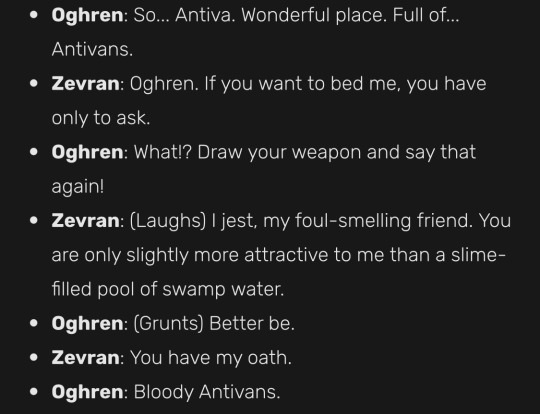
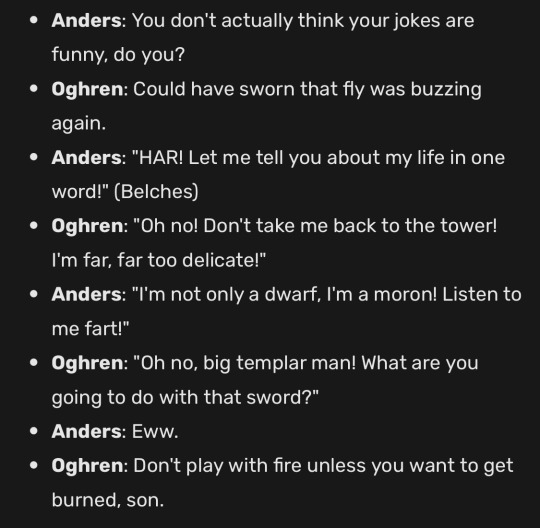
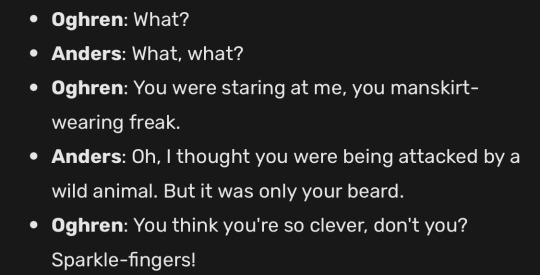
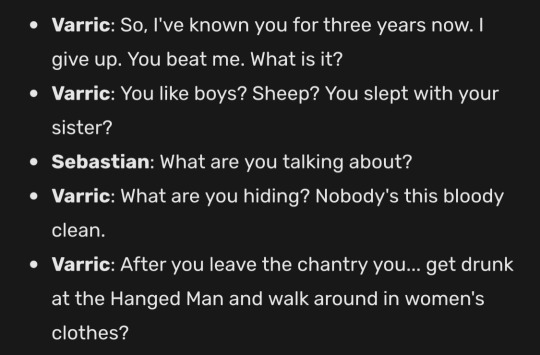
in general my point is that like. this was homophobic. if people didnt. uh. clock that oghren’s violent reactions and references to manskirt-wearing freaks were that. i’m using oghren as my main example because he’s the most overt. (generally orzammar’s dedication to lineage throughout the castes seems to give it more rigid gender and sexuality roles; there’s also significantly more overt sexism.) with zev and anders, it’s also compounded by fantasy racism and prejudice, in particular that male elves and male mages are both seen as effeminate in southern thedas. this isn’t just oghren. uh, for example, if a male hawke romances anders or fenris, gamlen, who iirc is as directly homophobic as it gets in da2, will make the comment “i guess i don’t have to ask which one of you’s the girl”. he’ll also make a fetishising comment about female hawke and isabela
otherwise. uh what might people not have clocked. zevran only flirts with a female warden in his introductory scene, due to his real, not unfounded concern that it will make a male warden more uncomfortable with him and, let’s not put too fine a point on it, thus more likely to kill him. zevran’s discussion of being bisexual himself is incredibly loaded and as i recall involves a fair bit of internalised something. from my delvings into the toolset, if you romance him as a man, you seem to have countless opportunities to break off the relationship specifically saying it’s because you’re both men and you can’t do this, including as late as the second time he offers you the earring. generally the male warden romancing zevran has a lot of internalised homophobia coded dialogue options when you ask him about his sexuality and when others ask you about the relationship—you can express dismay that zevran has told anyone, for example, while asking leliana not to say anything—and it’s fairly heavily implied that you’re likely to be more unfamiliar with such things
with anders, the most glaring example off the top of my head is that he doesn’t tell female hawkes about karl. a lot of the gendered differences in the anders romances are from homophobia/biphobia on a writing level as well, but considering that we’re not buying into “playersexual” nonsense i think it’s also fair to read this in-world as anders choosing not to bring that up to a woman who’s interested in him/someone he doesn’t know he has this in common with. the dialogue again treats anders as more experienced and gives male hawkes the opportunity to act surprised/uncertain even when they are the one to flirt first
this is basically just. if you didn’t clock that, that’s going on here! in general, heterosexuality is an assumed norm in thedas, and particularly characters coded as andrastian and fairly naive/inexperienced like alistair or bethany will express surprise or confusion about it and not pick up on implications. particularly noble characters will be expected to continue bloodlines and make political unions, for example, the inability of a female warden to marry anora or a male warden to marry alistair, even though it’s possible to do the m/f version of those political marriages without any kind of romance. that’s a pragmatic concern about the succession in a world that values bloodlines and thus comes with a certain heteronormativity. at the same time, there’s not so deep a stigma as you might expect if directly translating from our world, so to speak; it’s much more about the hope of continuing families and the importance of that in this world than there seeming to be any kind of explicit religious stigma? although it should be noted that the andrastian story focuses on andraste and the maker in what is treated as an m/f marriage and might be considered an ideal
for example, leandra will make an offhand, semi-teasing comment about finding hawke an opposite gender spouse, which i think is her hope of hawke managing to settle into kirkwall noble society and continue the family line when there is, in most worldstates, little to no hope of the other surviving hawke sibling having children. but at the same time, she’s casually accepting of hawke being in a queer relationship, will lightly mention it in dialogue, and makes no comment about anders or merrill moving in. i’d take that as kind of a baseline level of understanding for southern thedas, though it also varies from nation to nation, culture to culture, person to person, and class to class
i hope that makes it clearer ??
117 notes
·
View notes
Text
i'll have to rewatch the season but it almost feels like the cait/jinx parallel was completely lost on season 2? what made these two so cool and their conflict so interesting was that they were such incredibly similar people, but there's very little of that in season 2.
at the end of season 2 they both lost a parental figure (and additionally, both of them blame themselves!!) that was incredibly vital to their upbringing and the way they are now as adults. season 2 should have been about the grief they both suffered after losing their parents.
have both of them spearhead their respective war fronts. caitlyn fights zaun through organised ranks and precision fighting with rifles, heck, even bring in the grey, etc (basically how she does it in the show). meanwhile, jinx fights piltover through random, unpredictable terrorist attacks and her sheer volume of followers throwing themselves at the opposition, with her taking an active role in rallying them to be as chaotic as possible. this would work even further to highlight their differences, showing how though they begin at similar starting points, they both lean into each extreme (while both of them might originally be closer on the spectrum of chaos to control, they both go to polar opposites during s2).
then, have vi stuck in the middle. too chaotic for caitlyn's almost controlling, dictator-esque agenda, but too controlled for jinx's reckless abandon. create the show's conflict here, instead of bringing in third parties and other unneeded aspects of the story. caitvi divorce because vi isn't 'committed enough to the cause.' jinx won't take her sister back because she's 'chosen her side' and hasn't proven herself to have changed since the tea party. linger in this conflict between zaun and piltover, cait and jinx, and express it through vi. you could literally express all of the differences between zaun and piltover and a possible route for peace through this one interpersonal conflict that has already been set up in season 2!!!!
this should be the main plot, same how vi + cait vs silco + jinx was in the first season (arguably s1 has so many important things to it that there isn't really one main plot, but the climax of the show is during the tea party which is the resolution to this particular plot. so i am calling it the main plot). THIS IS WHAT THE SHOW IS ABOUT!!! the story writes itself tbh. it's a huge shock to me that the writers didn't go with this.
the cait/jinx parallel, not to mention the countless other foils and parallels (which was what made the show so good!!!) are seemingly abandoned in s2 and that's why it falls so flat. connections are hardly drawn between characters. isha is SUPPOSED to be a parallel to powder, but the connection is visual, nothing more. isha possesses none of powder's original characteristics - in fact, she has no characteristics, because all she exists as is a plot device, a ticking time bomb to go off when jinx needs to have her emo arc! if you can draw any parallels that operate as well as season one's did, you are welcome to point them out, but imo none of them hit as good as season one, where we had silco and vander opposite to jinx and vi, jinx vs cait, viktor vs mel, sevika vs vi, i mean i could go on. these connections feel sidelined or even absent from season 2 - or at least are not the highlight.
for example, viktor and mel are both mages, and how they obtain this power is evident of their differences, but we do not spend near enough time on these plots to warrant me giving a fuck, nor are the differences stark enough - because yes, mel is more privileged and has a birthright to power, but a big part of her character is that she was exiled from noxus and had to build her empire in piltover instead of relying on her family. the difference needs to be more dramatic to drive the point home - in season one, they differ so much because viktor cares about what hextech can do for others, using himself in the process, while mel cares about what hextech can do for her, using others in the process. the development for both of them comes when the opposite occurs - viktor accidentally kills sky, and mel sacrifices her pride and her place within her family to side with jayce in his effort to reunite piltover and zaun. the parallel was on multiple layers and carried through their entire character arc. frankly, we don't see enough of mel or viktor (or at least, anything that showcases their motivations) to draw proper connections in season 2, which is why both of their mage arcs feel lacking.
what made the story work so well in arcane is that you could look up and see that absolutely everything was connected, right down to the last detail. they've forgotten that connection in season 2, and it's made the scenes, the arcs, and the conflicts feel completely detached from one another, leading to the season feeling stilted. it's like the writers forgot what they had done so well in season 1 and decided to just throw everything they had in their brains onto the page without any regard for the care that had been previously put into them.
#this was originally supposed to be about just cait and jinx.... but ig it just went on#but! im right#this is a bunch of word vomit and i have not proofread nor thought about it much deeper than this but like#this is probably one of the big problems in season 2 lol#arcane critical
10 notes
·
View notes
Text
Here we go again. Another institution, brimming with self-righteous faux outrage, is trying to airbrush JK Rowling’s name out of history. This time it’s the turn of the Museum of Pop Culture (MoPOP) in Seattle, Washington, which has removed the world-famous author’s name from its Harry Potter exhibition. Last week, the museum announced that while it will continue to display memorabilia from the Harry Potter books and films, it wants no association with their supposedly problematic creator.
Explaining the decision in a 1,400-word blog, the museum’s exhibitions project manager, Chris Moore, brands Rowling a ‘cold, heartless, joy-sucking entity’. Moore, who identifies as trans and uses ‘he / them’ pronouns, takes exception to Rowling’s ongoing interest in preserving women’s hard-won rights over the ‘right of anyone who insists they are who they say they are’. Once again, Rowling’s reasonable and rational defence of women’s sex-based rights is being presented disingenuously as ‘hateful’ or ‘harmful’ towards transgender people, and therefore deserving of cancellation.
Moore even seems to think it would be better if Rowling had never existed. ‘We would love to go with the internet’s theory that these books were actually written without an author’, he writes, ‘but this certain person is a bit too vocal with her super hateful and divisive views to be ignored’.
Strikingly, Moore goes a few steps further than most of Rowling’s critics. He doesn’t just accuse her of transphobia. He also accuses the Harry Potter books of peddling ‘racial stereotypes’, promoting ‘fat shaming’ and, perhaps most heinous of all, lacking ‘LGBTQIA+ representation’. Surely to goodness there must have been a few pansexual / nonbinary students in the imaginary, magical school of Hogwarts? Shame on JKR for not giving them a voice, eh? The headmaster, Albus Dumbledore, might have been gay, but apparently that’s not enough in our world of 764 genders.
I find myself torn about this particular non-event, to be perfectly honest. On the one hand, I realise this is simply the latest in a long line of attempts to shut Rowling up. ‘I saw Goody Rowling, in the barn, consorting with the devil!’ is the tone of every such outburst. By now, these tricks have become cheap and obvious to anyone observing closely. The smears are always baseless.
On the other hand, the attempts to erase Rowling are deadly serious. Each attempted takedown inevitably leads to her receiving the vilest, cruellest abuse. Abuse which, if you’ve ever taken the time to read it, contains some of the most horrific things one human could say to or about another. Rowling is no doubt a tower of strength and resilience, having been on the receiving end of this bile for years. But it’s probably still having an effect on her, deep down.
Perhaps there is an upside to this stunt by Moore and the MoPOP, however. Removing Rowling’s name from the museum, and condemning her as ‘super hateful’, is so infantile that most right-thinking people will likely see it for the foolishness it really is. Sunlight, on occasions such as these, has a remarkable effect of highlighting the absurd and often cruel behaviour of the gender ideologues. People are getting wise to these smear tactics now that they are so regularly churned out. The problem is it is difficult to get people to speak out against them.
Sadly, most people are still too scared to speak up. This shouldn’t surprise us when the extremist factions of the trans movement use threats of rape, violence and torture to bring people into line. They doxx people’s addresses and workplaces, so the heretics can be hunted down and vilified, resulting in the loss of earnings, jobs, reputations and more. There are countless examples of this. And no doubt there will be many more to come.
Faced with this, we cannot simply stand by and shrug. We have to stand up to the smears. The truth is that Rowling has never said anything untoward about trans people. She has been critical of the behaviour of some trans fanatics. She has been vocal in her support for single-sex spaces for women and girls. And yes, she has vociferously defended herself against hourly abuse. As she damn well has a right to do. But she is not the bigot she has been made out to be.
It’s time we all speak up for what is right. It’s time to break the cycle of fear. It’s time we called out this public assault on JK Rowling – and on all the other gender-critical feminists who’ve been similarly maligned. We need to put a stop to this authoritarian movement.
----------------------------
James Dreyfus is an actor who has starred in Gimme, Gimme, Gimme, Absolutely Fabulous and The Thin Blue Line.
76 notes
·
View notes
Text
How to Unstick Your Camp NaNoWriMo Project

Every year, we’re lucky to have great sponsors for our nonprofit events. ProWritingAid, a 2023 NaNo sponsor, helps you turn your rough first draft into a clean, clear, publish-ready manuscript. Today, author Krystal N. Craiker shares some tips on how to push through to the end of your writing project when you’re feeling stuck:
Camp NaNo is the ultimate test of your creativity. You push your writing skills and habits to a new level.
It’s inevitable that at some point this month—or any time when you’re writing a novel—you’re going to get stuck.
You’ll run into a plot conundrum, or you’ll feel creatively drained. You’ll stare at the page and have no clue what to write next.
It happens to all of us, so don’t worry. Here are some of my favorite ways to get my stories unstuck and my creativity flowing once again.
1. Go Outside
Writing is an isolating process, and writers are notorious for losing hours of the day to the computer screen. But when you’re stuck in a rut, staring at the page stressed out doesn’t make things better.
Get up. Go get a drink of water. Then go outside. What you do next doesn’t matter. You can get some exercise in or drive to the coffee shop. Birdwatch, play with the kids, splash in some puddles—you get the idea.
A little movement and some sunshine will help you feel refreshed when you sit back down at the computer.
2. Brain Dump
This is my tried and true method for NaNoWriMo. When I reach a point in my novel that I don’t know what to write (or just don’t want to write), I insert a random brain dump.
I’ll write what I’m feeling about this scene and type out what I think the issue is. Sometimes, it’s just a bulleted list and others it’s a stream-of-consciousness flow. Here’s an example:
“I don’t know what to write here. I was going to kill off that character but didn’t. Somehow I need to get to X plot point from here. How do I do that? This is so frustrating. Now that I didn’t kill them off, I need a good reason for them to stay in the story. What are their motivations?”
If that’s all you write during a writing session, that’s okay. You were still working on your novel, so it still counts.
3. Use AI
It’s the first NaNo event since Chat GPT opened to the public and countless AI tools are popping up. AI can be a great way to brainstorm and spark inspiration.
As writers, we often get hung up on finding the perfect way to say something. But you don’t need to let one sentence slow down your writing flow.
Rephrase by ProWritingAid is a brand-new feature meant for writers like you. You can highlight any sentence, click Rephrase, and generate a new sentence. Shorten or lengthen a sentence, change the tone to formal or informal, or add sensory detail.
Here’s a boring sentence I wrote: “Quinn entered the dark and cold forest.”
And here’s a sentence Rephrase gave me: “Quinn shivered as he stepped into the cold, dark forest, the air thick with the scent of damp earth.”
I can build off that! Now I’m more excited to write this scene that was feeling bland.
Sign up for ProWritingAid to get access to Rephrase and more than 20 in-depth writing reports.
4. Keep Going
Whatever you do, don’t give up! Getting stuck is part of the process. When you hit that creative wall, give one of these methods a try.
Your story still wants to be written, so keep writing.

Krystal N. Craiker is the Writing Pirate, an indie romance author and content writer who sails the seven internet seas, breaking tropes and bending genres. She has a background in anthropology and education, which bring fresh perspectives to her romance novels. When she’s not daydreaming about her next book or article, you can find her cooking gourmet gluten-free cuisine, laughing at memes, and playing board games. Krystal lives in Dallas, Texas with her husband, child, and two dogs.
Top photo by Kelly Sikkema on Unsplash
78 notes
·
View notes
Text
Sci-fi writers not being racist and unimaginative challenge (IMPOSSIBLE)
I had a dream that I tried to write this recently and accidentally replaced it with footage of me playing Deep Rock Galactic when I tried to post it, so I’ll try my best to not do that.
I know saying that a lot of fantasy and science fiction worldbuilding is barebones and bland is a pretty tepid take. In many fictional settings, the idea of nationality, ideology, and race are conflated. One and the same, effectively. Mass Effect has the Turian Hierarchy and the Salarian Union, galaxy-spanning governments made up of almost singularly the species turians and salarians respectively, who all believe in roughly the same things, have the same broad personality, and have seemingly been stagnant for thousands of years. Deviation from the turian mentality is treated as a unique trait worthy of ascending a random NPC to a supporting character. To all other races, the idea that humans can believe in different ideologies is fascinating. I think it’s an uncontroversial take to say that this is pretty bland writing, and at least a bit racist. Outside of the special and unique (and overwhelmingly European) humans, all other cultures are monolithic and simplified.
I should stop myself here because I genuinely have at least half a dozen essays’ worth of Mass Effect topics I would want to go on a rant about. I should move on.
Orson Scott Card’s writing beyond the original Ender’s Game is also emblematic of this approach. In his sci-fi universe, all of the countless worlds that have been colonized are entirely monocultural. Specifically, they are takes on cultures from the point of view of a 30-something center-right mormon in America in the 1980’s. Highlights include a world colonized by the Japanese which bears the name Divine Wind, which translates to ‘Kamikaze’, which might be in slightly poor taste. There is also a world with a predominately Chinese population that is notable for a) being largely covered in rice fields, and b) not knowing what neurodivergency is. It gives overwhelming ‘I read a Wikipedia article and skimmed a really racist history book and am now an expert on all other cultures” vibes. He also wrote Xenocide and Children of the Mind, so maybe we should stop taking him seriously.
So often, worldbuilding in fiction refuses to reckon with the idea that the nations they depict can be anything beyond overwhelmingly monocultural stereotypes of real-world people. After all, it’s much simpler if all of the aliens are just caricatures of other people that really exist, right? No work needed. Oh no, what's this picture of a T'au doing here?
This took me a while to write because I’ve got a lot of takes on the topic of writing and worldbuilding, and it was hard to figure out what to include and what to save for a more focused post later. On that topic, I do have another one planned focusing on my personal, insignificant takes on the ingredients to make a coherent backdrop for a story, and some hot takes and blanket statements to make about worldbuilding as a whole. It’ll hopefully be something more positive and constructive than this.
EDIT MADE MINUTES AFTER I POSTED THIS: I forgot to include the funniest example of all time, the world of Warhammer Fantasy. There are some incredible examples of this kind of worldbuilding. Kislev, the Lizardmen, Cathay, Nippon, Araby, the Tomb Kings, Bretonnia, all comically transparent carbon copies of the most obvious, stereotypical parts of real-world cultures that managed to become a relatively successful media franchise that helped to launch Games Workshop into the company it is now.
#mass effect#mass effect is actually kinda bad#worldbuilding#orson scott card#ender's game#warhammer#sci fi#short essay#okay but seriously mass effect is baffling#did we all forget the line about autism from the dlc#orson scott card is a hack
26 notes
·
View notes
Note
Do you ever get caught up on the fact that the Arrancar are legions? I often have to stop and take a minute to think about the hundreds to thousands of souls that make up the Arrancar like a soul puzzle and it just happens that the strongest soul in the legion is the personality they display. (ԾㅂԾ)
-jplupine
When it was first explained how hollows could become Adjuchas and Vasto Lordes, it literally boggled my mind. Similarly to how it feels when you try to comprehend the size of the universe 🫨 it’s just beyond our capabilities
Most hollows are mindless, killing machines. Only thinking about their next meal. There are some hollows, however , who seem to retain some of their more dominant personality traits from when they were human. One of the best examples I can use is the hollow early on in the series, Shrieker. As a human was a sadistic serial killer, as a hollow he held onto those sadistic tendencies by torturing the young boy Yuichi Shibeta, who’s soul was trapped in the parakeet

I 💯 believe Shrieker had the potential to become an adjuchas, and therefore an Espada later down the line.
I like to think that everyone’s soul is made up of all these different emotions, in varying levels. Everyone has the potential to love and hate, hurt and heal. Feel joy and hatred, fear and confidence. I think that the dominant trait of that soul, fuels the hollow.
When they consume other hollows, and their souls, their dominant trait grows bigger and stronger with the same trait it had taken from the soul it had just devoured, the rest of the soul going towards the strength and power to the physical body.
All the Espada have such strong personalities, with particular traits highlighted, to almost an obsessive, consuming level, almost over showering every other part of their personality, that this leads me to feel right in my assumption.
If enough of them dogpile each other, trying to feast on the other hollows, then they will merge into a single entity that contains all the minds and powers of the hollows involved. A Gillian-class Menos Grande is born.
When that hollow then goes on to a menos, most of them return into the mindless, hive like state of the other menos, loosing their identity completely . I believe only the souls with strongest, most undeniable traits, grown larger by all the other souls, can make it to the forefront, and control the menos as themselves and reclaim their identity.
This hollow morphs the Gillian into a new, unique form. Adjuchas or vasto lordes. Were already in the hundreds or thousands of hollow souls, all devoured and combined to strengthen this one soul. Which is amazing to me. These Adjuchas are physically smaller than Gillians, tho incredibly stronger and smarter. Grimmjow is a great exaplme for the Adjuchas class: a panther hollow, vicious, a hunter, nimble and strong. He can take on Gillians with ease. But they have to work hard to stay that way, because if they don’t eat, they’ll loose their power and their mind, reverting back into the mindless Gillians, giving one of the other strong souls their chance to take over.
Alternatively, if an Adjuchas does eat enough hollows and gain enough power, it can evolve yet again, and become a Vasto Lorde. While this is very rare, it can happen, as we saw with Tier Halibel, Starrk, even the grand fisher made a reappearance as one. They are human in shape and appearance, incredibly powerful and fast, most similar to the final Espada.
All these souls, countless lives lost, combined to make just one entity, it mind blowing. When a hollow is cleansed, they free the souls. I hope that’s the case for all the levels of hollows. How many millions of souls would be lost otherwise with the defeat of most of the Espada?
13 notes
·
View notes
Text
Locked, Loaded, Ludicrous: Five Games with the Craziest Guns
Shooters seem to make up a significant portion of video games these days, don’t they? A lot of them try to be super-realistic, with real-world guns that act exactly like they do in, well, the real world. Then there are these games. Realism? Never heard of it. Cranking up the absurdity to 11 with guns that break all sorts of physics in increasingly hilarious ways, these games throw sensibility aside in favour of the most bizarre, overpowered, or downright silly firearms ever fired. Hope you’ve got an itchy trigger finger!
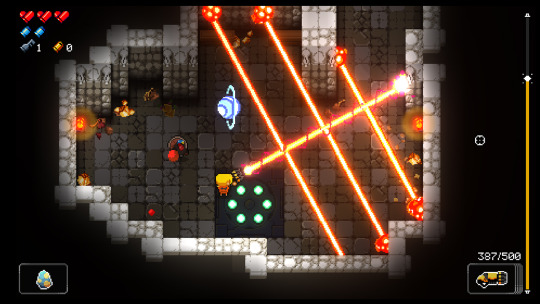
Enter the Gungeon What happens when you take a dungeon-crawling roguelike and turn everything into some kind of gun? You get Enter the Gungeon. The enemies are bullets, the shopkeepers have guns, the walls have guns, the guns have guns! With over 200 firearms that the player can use, the Gungeon is locked and loaded with the strongest and goofiest weapons in gaming. Most of the guns are also based on puns or references - do you want to carry Judge Dredd’s handgun or Megaman’s blaster? Or perhaps you’d rather be shooting fish out of a barrel, or launching bee-filled rockets with the Stinger? In the Gungeon, even the strangest vaguely-gun-related concepts can be weaponised. For example, you know how a lower case “r” looks somewhat like a little gun? Well, now it is, and it shoots letters that spell out “B U L L E T”. Alternatively, you could use the Bullet, which is a large bullet that fires entire guns that themselves fire bullets. Need I go on?
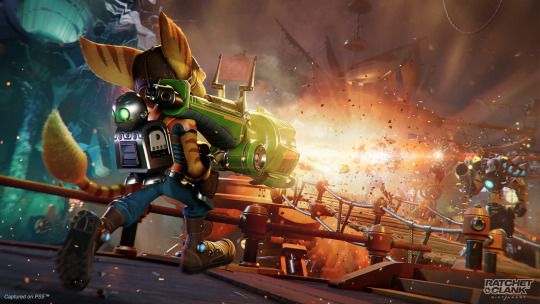
Ratchet & Clank Few game series embody trigger-happy chaos like Ratchet & Clank does. The first game alone even had an ad campaign focused on how impossibly over-the-top the guns would be in real life. “36 weapons and gadgets not fit for this world” proclaimed the ads, and the games only grew more crazy from there. From the Sonic Eruptor (a frog-like creature with shatteringly loud burps) to the Rift Inducers (tiny little pistols that generate massive black holes), Ratchet & Clank is the king of awesomely bizarre blasters. Of course, let’s not forget the highlight of each game’s weapon wheel: The RYNO (Rip Ya a New One), the strongest gun in the original game with increasingly destructive successors in almost every following game. The RYNO went from a rapid-fire missile rack to screen-annihilating laser cannons and orchestral-music-blasting missile-launching machine guns, culminating in the RYNO 8 which was powerful enough to rip through space-time and drop enemies from entirely different games on your foes. “Not fit for this world” indeed!
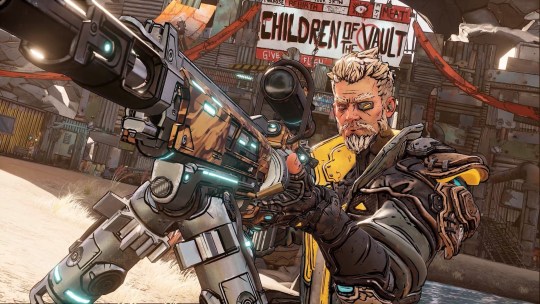
Borderlands The Borderlands series features billions of unique guns - and no, that’s not even a marketing exaggeration. The series even earned the Guiness world record for the most guns in a video game! Naturally, there’s plenty of “normal” guns, but that’s not why people play Borderlands; it’s the countless physics-defying chaos-inducing firearms that sell the games. The guns are all built by various in-universe manufacturers that each specialise in their own brand of mayhem: Jakobs gives us hand-cranked assault rifles and snipers that ricochet bullets from headshot to headshot, Maliwan features sci-fi-style laser beams with elemental effects, Vladof boasts the highest-firerate weapons described as “bullet hoses”, and then there’s Torgue. Each Torgue gun features explosive bullets, and special mention goes to the SWORDSPLOSION!!! Yes, the gun’s name is always written in all-caps with several exclamation points. That’s what you get from a rocket launcher that fires giant flaming swords that explode into more swords. TORGUE!
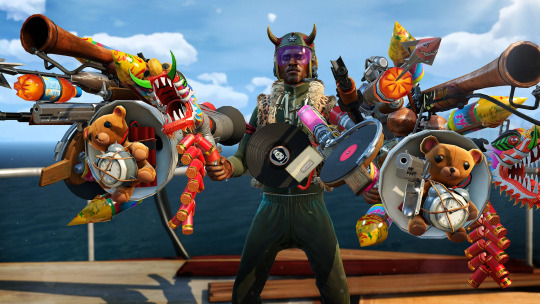
Sunset Overdrive As the team behind Ratchet & Clank, Insomniac Games certainly seem to have a knack for absurd guns, so it’s no surprise that Sunset Overdrive takes their talents for destruction to a new level. Locked in a city swarming with energy drink zombies, the residents of Sunset City have had to get creative when it comes to defending themselves. Who knew lawn sprinklers and vinyl record players made such great zombie-hunting tools? A large majority of the strange guns at your disposal are built from various mundane objects, like propane tanks turned into oversized bombs, or even a weaponised bowling ball return machine. Some weapons are also a bit more absurd; who thinks of stuffing a teddy bear full of dynamite and using it as ammo? The inventor of the TNTeddy, that’s who. While there’s a small number of “normal” guns, like a revolver dubbed the Dirty Harry, it’s the crazy stuff like a makeshift harpoon gun or a liquid nitrogen bomb launcher that really puts the apocalypse in the player’s own hands.
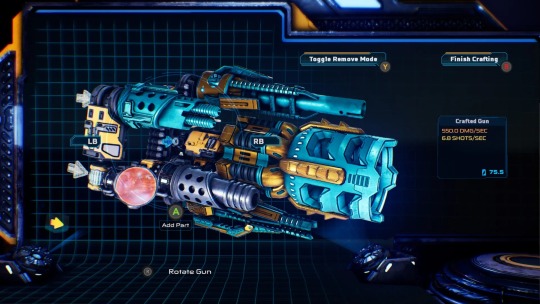
MOTHERGUNSHIP Okay, I might be cheating a little by including this game. Unlike the other games in this article, MOTHERGUNSHIP doesn’t have a set selection of crazy guns - the player creates the crazy guns. This breakneck-speed roguelike shooter has the player collect more and more gun parts over the course of a run, slapping together barrels, connectors and modifiers to design your own death machine. While you might only start off with a pair of rapid-fire shotguns, by the end of a good run you could end up with a forty-barrelled rocket-launching laser-spewing screen-obscuring chaingun that obliterates entire rooms and sends the player flying backwards from the sheer recoil. The options are practically endless too; besides the standard shotguns and lasers, you could also include sawblade launchers, firework launchers, flamethrowers and the explosive Barrel Barrel in your weapon of choice, plus countless more over-the-top parts to slap together, building the ultimate death-dealing tool of destruction with nigh-infinite possible combinations.
Realism is all very well and good, but these games and more demonstrate that sometimes, it’s good to throw reality out the window in favour of fun. Are there any other games that fit this list? Let me know! Reblogs and likes are much appreciated, and thank you for reading!
#gaming#article#guns#enter the gungeon#etg#ratchet and clank#rac#insomniac games#borderlands#sunset overdrive#mothergunship
3 notes
·
View notes
Text
The concept of Resilience and “Girl, Woman, Other”:
In our second session on Bernadine Evaristo’s “Girl, Woman, Other”, we among other things talked about the concept of resilience and how it can be made out or applied to the lives of our characters. However, we also took our time to highlight, that we cannot look at the concept of resilience without mentioning that in our society some people are asked to cultivate higher levels of resilience than others, due to prevalent forms systemic oppression like racism and sexism. In their anthology “Identity as Resilience in Minoritized Communities. Strength-Based Approaches to Research and Practice” the social scientists Julie Koch, Erica Townsend-Bell and Randolph Hubach furthermore argue, that the concept of resilience tends to act flattening, as groups of different origin, and with different stories and histories would be subsumed under categories such as BIPOC, which are often unable to illustrate the specificity of the different experiences of oppression that people suffer from.[1] Thus, marginalization becomes a central marker of identification, instead of a condition to fight against.[2] And when looking at the social services sides of it, those wanting to foster resilience would subsequently promote a standardised toolkit for a wide range of situations, not only ignoring the fact that different situations ask for different ways of practising resilience, but also undermine those already in places, which would more often than not are a result of interchanges with the own community.[3] That being said, I, in the following, would still like to think and talk about the strategies some of the characters have developed to overcome their societal exclusion and their personal trauma, focusing on two of the protagonists of our second chapter, namely Carole and Bummi.
Our first character of the second chapter is Carole. Carole is a young investment banker who grew up in Peckham with her single mother Bummi, as her father Augustine has died from a heart attack when she was still a small child. Both of her parents are highly educated. As they were unable to find a position that matched their level of education in Nigeria, both of them came to England – only to be crushed by countless rejections.[4] In the end Bummi thus opts for a job as a cleaner, which later turns into the establishment of her own cleaning company. Carole, who knows how much her mother has struggled, and also falls victim to sexual assault by one of her classmates brother and his friends, decides to make it out of Peckham, by working hard. Eventually she is offered a place in Oxford, where she studies mathematics. But though she likes the classes, she often feels amiss, not being used to the posh environment and struggling to fit in with the other students who clearly come from generational wealth. She thus starts to adapt to the others, for example through changing the way she expresses herself[5] or the way she dresses.[6] Her way of coping is thus to change herself, which leads her to leave her old life behind at an increasing rate. She later becomes the vice president of a big bank, and though still having to deal with episodes of everyday racism, for example when others compliment her English or when clients are surprised that she is black,[7] as well as sexism,[8] she ends up being quite comfortable in her position. Her fiancé Freddy also contributes to this, as he is willing to take over a lot of the domestic duties[9] and tends to help her too loosen up, something which is arguably not as easy for Carole, as the memories of the gang-raped she experienced as a teenager are still frequently haunting her, maybe especially so, as she has never been able to confide in anyone. Instead, she is keeping them locked away[10] and fighting her uneasiness with a rather strict regimen of running: She runs for her life because to slip up is to begin descending the slippery slope to giving in to failure, to inertia, to feeling sorry for herself about the moment in her life which still creeps to the front of her memory when she least expects it.[11]
As one can imagine, Bummi is not exactly thrilled about the way her daughter changes, at some point she even refuses to speak to her.[12] In her chapter we learn, that Bummi lost both her mother and her father at a very young age, ending up in the care of her aunt who treats her more like a servant, than a child.[13] She eventually meets Augustine who becomes her husband and leaves for England – only to lose him to an untimely death. As she is left alone, she decides to “do what Augustine was himself too weak to do”,[14] namely to employ others. Something which does work out, as her cleaning company is growing rather fast. Moreover, through her own company she actually meets two of her lovers, of whom one even becomes her husband in the end. As we can thus see, both Carole, as well as Bummi have found some sort of fulfilment through their career, as they have managed to escape precarity through their intellect and hard work. All in all, this might seem like a rather neoliberal narrative, but it is also surely one that has indeed been lived by people who immigrated to Great Britain. However, one cannot forget, that both Carole and Bummi, are still black, and thus still scrutinized and excluded by their peers, as for example the day-to-day racism Carole has to endure in her workplace show or their encounter with Freddy’s family show.[15]
[1] Julie Koch, Erica Townsend-Bell and Randolph Hubach: Preface. In: Identity as Resilience in Minoritized Communities. Strength-Based Approaches to Research and Practice. Edited by Julie Koch, Erica Townsend-Bell, Randolph Hubach. Cham 2023, p. vii-ix. Here p. viii.
[2] Ibid, p. viii.
[3] Ibid, p. viii.
[4] They did not know that curled up inside her was a parchment certificate proclaiming her a graduate of the Department of Mathematics, University of Ibadan just as she did not know that when she strode on to the graduation podium in front of hundreds of people to receive her ribboned scroll, and shake hands with the Chancellor of the University, that her first class degree from a Third World country would mean nothing in her new country especially with her name and nationality attached to it and that job rejections would arrive in the post with such regularity she would ritualistically burn them in the kitchen sink. Bernadine Evaristo: Girl, Woman, Other. London 2019, p. 264.
[5] Carole listened and learned from her new social circle what would you like? Instead of whatdyawant? To whom were you speaking? Instead of who was you talking to? I’m just popping to the loo instead of I’m gonna go piss. View Ibid, p. 216.
[6] Carole amended herself to become not quite them, just a little more like them she scraped off the concrete foundation plastered on her face, removed the giraffe-esque eyelashes that weighed down her eyelids ripped of her glued-on talons that made most daily activities difficult (…) she ditched the weaves (…) she then had her tight curls straightened. View Ibid, p. 217-218.
[7] She’s thinking he’d better not do a double-take when she enters the executive meeting room one long glass wall looking out on to the City the other bearing a massive splash of tax deductible artwork that cost the price of a Zone 2 town house she’s thinking he’d better not look at her as if she should be attached to a trolley bearing flasks of coffee, assortments of teas (herbal, green, grey, Ceylon) and those individually packaged corporate biscuits. She’s used to clients, and new colleagues looking past her to the person they are clearly expecting to meet (…) except she can’t help remembering all the little hurts, the business associates who compliment her on being so articulate, unable to hide the surprise in their voices, so that she has to pretend not to be offended and to smile graciously, as if the compliment is indeed just that. View Ibid, p. 187-189.
[8] Perhaps he’ll find himself unexpectedly attracted to her, which the more sophisticated try to hide, unlike the Nigerian petrochemical billionaire a few years ago (…) who invited her to working lunch at the Savoy, only for her to discover it was in his private dining room in the Royal Suite (…) he pointed out the mattress in the master boudoir was hand-sprung with each spring wrapped in cashmere. View Ibid, p. 188.
[9] I’ll be the househusband in the relationship, he promised, hang prettily off your arm when required, mow the lawn, make jam, supervise the housekeeper and raise our lovely tawny offspring she loved that he was prepared to be subservient to her ambition. View, p. 236.
[10] View Ibid, p. 191.
[11] View Ibid, p. 221.
[12] Bummi continued to ignore her daughter on the three-seater settee in the sitting room where they usually jostled up against each other (…), she refused to let Carole massage her tired feet with cocoa butter as usual, and played deaf when she gingerly asked if she could make her a hot mug of Milo, Mother? Bummi sat at the other end of the sofa in stony faced silence, sniffing at regular intervals and wiping her eyes until the girl left the room, View Ibid, p. 246.
[13] Bummi had to be on call before and after school. Boomeee!!! Aunty Ekio shouted for her morning tea in bed, or if the furniture was not polished enough, or the children had messed up their clothes, or she wanted help in the kitchen, or for Bummi to change the television channel for her, or she needed something from the market (…), View Ibid, p. 257.
[14] View Ibid, p. 268.
[15] Freddy arranged for Bummi to meet his parents in a London restaurant, which she was looking forward to except he warned her that although they’d warmed to the idea of Carole, once they saw how classy, well-spoken and successful she was (most importantly for his mother, how slim and pretty, too) they’re still old-fashioned snobs. Freddy’s father, Mark, looked uncomfortable said little at the dinner, Carole sat there with a fake smile plastered on her face the whole time Pamela, his mother, smiled at Bummi as if she was a famine victim, when she started explaining the meaning of hors d’oeuvres to her, Fredd told her to stop it, Mummy, just stop it she gave Bummi a vintage bottle of wine from their vault, which really needs to be divested of its crumbling cork before it’s more sediment than liquid’ (…). View Ibid, p. 293-294.
0 notes
Text
Music That Stands the Test of Time
Timeless music has a unique ability to transcend generations, resonating with listeners long after its release. From heartfelt lyrics to innovative compositions, certain tracks and artists create a legacy that remains untouched by trends. In this article, we explore the elements that make music timeless and highlight songs and artists that have left an indelible mark on the world.
The Emotional Connection of Pop Ballads
Pop music has always excelled in connecting with listeners on an emotional level. A perfect example is Sam Smith’s "Too Good at Goodbyes lyrics." This ballad captures the pain of heartbreak with raw honesty, allowing listeners to see their own experiences mirrored in its lyrics.
The timeless appeal of such songs lies in their universal themes—love, loss, and resilience. Tracks like these continue to find new audiences, proving that when music touches the heart, it becomes immortal.
Rock Legends and Their Lasting Legacy
Rock music has produced countless anthems that continue to dominate playlists even decades after their release. Bands like Linkin Park have contributed significantly to this legacy. With the introduction of the Linkin Park new singer, the band has managed to evolve while retaining the powerful lyrics and sound that first won them global acclaim.
Their music, filled with introspective themes and high-energy compositions, resonates deeply with fans navigating challenges. It’s this relatability, combined with their signature style, that ensures Linkin Park remains a cornerstone of rock music.
Cultural Pride in Regional Music
Regional music often becomes timeless when it captures the essence of a community’s identity. Sidhu Moose Wala’s tracks are a testament to this. The story behind Sidhu Moose Wala name reflects his journey from a small-town artist to a global sensation, and his music serves as a celebration of Punjabi culture.
By blending traditional elements with modern beats, Sidhu Moose Wala’s songs appeal to a wide range of listeners. His lyrics, which often explore themes of pride, struggle, and belonging, ensure his work continues to be cherished by fans worldwide.
The Enduring Charm of Christmas Music
Seasonal music holds a special place in the world of timeless tracks. Famous Christmas songs like "Silent Night" and "All I Want for Christmas Is You" are a staple of holiday celebrations. These songs bring people together, evoking nostalgia and a sense of joy that transcends age and background.
Their lasting appeal is rooted in their ability to capture the spirit of the season, making them a tradition for families and communities alike. Each year, these tracks return to the forefront, proving their enduring relevance.
Creativity and Imagination in Thematic Songs
Songs that tell unique stories or explore imaginative themes often stand out as timeless pieces. Tracks featuring vampire song lyrics are a great example. These songs use vivid imagery and metaphorical storytelling to create an experience that feels fresh and engaging.
By offering listeners something out of the ordinary, such tracks carve out a niche for themselves. Their creativity ensures they remain memorable, even as trends in music come and go.
What Makes a Song Timeless?
Timeless music often shares a few key characteristics:
Universal Themes: Songs that explore universal emotions like love, hope, or loss tend to resonate across generations.
Relatability: Lyrics that listeners can see themselves in create a strong connection between the artist and the audience.
Innovative Composition: Unique melodies, arrangements, or production techniques can give a song a distinct edge, making it unforgettable.
Cultural Relevance: Tracks that capture the essence of a culture or era often hold a special place in history.
The Role of Technology in Preserving Music
Advances in technology have played a crucial role in keeping timeless music alive. Streaming platforms like Spotify and Apple Music make it easier than ever to discover classic tracks, while social media allows fans to share their favorite songs with a global audience.
For example, iconic rock anthems or emotionally charged pop ballads often find renewed popularity when they become part of trends on platforms like TikTok. These digital avenues ensure that timeless music continues to inspire new generations.
The Artists Behind the Magic
While songs themselves are important, the artists who create them play an equally significant role in their longevity. Performers like Sam Smith, Linkin Park, and Sidhu Moose Wala bring their unique perspectives and experiences into their music, making it deeply personal and relatable. This authenticity is what turns good music into great music.
Their ability to connect with listeners on an emotional level, combined with their willingness to adapt and evolve, ensures that their work remains relevant even as the music industry changes.
Conclusion: Music’s Eternal Appeal
Timeless music is a gift that keeps giving. Whether it’s a Christmas classic, a heartfelt ballad, or a cultural anthem, these tracks remind us of music’s ability to transcend boundaries and connect us all. Artists like Sam Smith, Linkin Park, and Sidhu Moose Wala, along with unique tracks like vampire-inspired songs, showcase the diverse ways music can capture the human experience.
What’s your favorite timeless track, and what makes it special to you? Share your thoughts in the comments below!
0 notes
Text
IST3310.01 - Who Chooses Which Channels and Why?
Let's explore the channels involved in a digital ecosystem!

What are the functional distinctions of various social media channels that would merit an organization to incorporate them into their ecosystem over another channel?
I'll discuss the differences as described by the major players in social media today:
Facebook (social networking) - user-generated content (UGC), memes, and content designed to be shared to a user's feed and start conversations
Instagram (social networking and image sharing) - images, videos, behind-the-scenes; following trends; capturing selective glimpses into the culture of a company
X (Twitter) (microblogging) - text-based content; conversations and debates; news sharing; informative and relevant niche content
YouTube (video sharing) - walkthroughs, vlogs, guides, and stories that cater to specific interests; long and short-form video
TikTok (short-form video sharing) - versatile story-sharing and flexible content; relatable, authentic information sharing
Pinterest (image curation) - visual search engine with inspirational, motivational, and aesthetic ideas
LinkedIn (professional networking) - thought leadership, insights, industry updates, and job postings; professional development
Discord (instant messaging and VoIP) - group and individual messaging platform with video chat capabilities; internal communications or public fan conversations
While there are countless other social media platforms out there, these are the main ones that companies look to when branching out their digital ecosystems.
Which channels lend themselves to specific purposes within an ecosystem and which channels tend to be consider globally integrated by all organizations and why?
Most organizations I have seen will have a website, email, SEO, online PR, and social media. From there, depending on the company, SEM, mobile apps, display ads, and various forms of marketing (including video and influencer marketing) will be selectively chosen based on needs. For example, a startup may choose to incorporate influencer marketing to promote their product, but they may not have the funds or even the need to have an app or to utilize display ads. Choosing the channels for your business primarily depends on your target audience and the areas of which they would be impacted the most.
Highlight an example of an organization that you believe has an effective digital ecosystem. What leads you to this conclusion?
A local to Lubbock digital ecosystem that I find very effective is the LHUCA (Louise Hopkins Underwood Center of the Arts).
The LHUCA has established themselves very well, not only culturally in Lubbock, but also in their digital presence. They have their recently-updated website which details all of the many events and initiatives the non-profit has, as well as links to their different socials (Facebook, Instagram, TikTok). While the weakest of those three is definitely their TikTok page, they still post relatively regularly and maintain a good following and view ratio. The detail that they put into each of their channels and their organization's image have created a thriving ecosystem that only continues to grow.
0 notes
Text
27/9/24 Fact or Fiction
Statement #1: You’re excited to see Cody Rhodes and Roman Reigns as a tag team. FICTION - Less because of the PTSD of countless "But can they co-exist" storylines so beloved by this week's main character of Netflix, and more because the options are either they crush Zombie Bloodline as that's the most logical booking decision, or they lose to Zombie Bloodline to drag out the storyline until the other logical booking decision which is Cody, Reigns & The Usos vs Zombie Bloodline in a WarGames match where OG Bloodline crush Zombie Bloodline, but either way we still have to watch Tonga Loa matches in the interim and that's the real reason I'm not excited
Statement #2: The AEW All Out PPV was too violent. FICTION - As well as being the most obviously performative "outrage" outside the Arsenal fandom whenever referees don't award them eighteen penalties per match, the pearl clutching not only involves the wrestling culture warriors pretending Mick Foley's WWE career highlights don't exist, but can be summed up by the phrase "Why don't AEW book differently to WWE? NOT LIKE THAT!!!" that makes me wonder if the performative twerps could have survived an ECW PPV
Statement #3: With the reduction of house shows, 5-match PLE cards, bragging about record gates thanks to historically high ticket prices, more on-screen product placements and commercials cutting into matches, WWE is currently practicing some heinous shrink-flation. FICTION - What WWE are actually doing is price gouging to such a degree that even Liam & Noel Gallagher might think it's a little much, and that's been obvious since they charged more for Clash at the Castle tickets than Celtic or Rangers do for a season ticket
Statement #4: Despite having a lot of factions these days, WWE should avoid making a 6-man tag team championship. FACT - WWE should have their own booking ideas, not copy AEW's. That's how it works, right...?
Statement #5: Jon Moxley will defeat Bryan Danielson for the AEW World Title and send him into (semi) retirement. FICTION - The main reason I can't see that happening is, while it would be a logical endpoint to the BCC civil war, it doesn't actually fit Mox's current storyline where he's going after Day One AEW guys who haven't lived up to their potential (as long as we ignore that he started by targeting multi-time TNT champ & former tag champ Darby Allin, for the sole reason that the most logical target Sammy Guevara would see the crowd cheer when Mox merks him as nobody gives a Mile High Club about Sammy Guevara) and it's far more likely that Wheeler Yuta costs Mox the match as that's the most logical thing to happen in the storyline
Statement #6: Pro-wrestling is better when it’s predictable. FICTION - First of all, it has to be pointed out there's good predictable and bad predictable. Good predictable certainly does make wrestling work as that's when storylines culminate at their logical endpoint in the ideal way, for an obvious example Austin overcoming obstacle after obstacle to win the title at WM14. On the other hand there's bad predictable, which summed up most of Roman's Reign of Terror because there was no point getting invested in the vast majority of his title matches as you knew the only relevant part was the last three minutes where Reigns kicked out of a finisher, The Usos interfere, guitar shot, Pedigree, and the nWo stand tall yet again because CENAWINSLOL which is the issue with predictable booking, as for every good predictable booking choice there's a dozen bad ones. Not that booking should always plan to throw a curveball for the sake of throwing a curveball (bro...), but the balance between good predictable and bad predictable is a very precarious thing and all too often it tilts towards being predictable in the worst way possible
0 notes